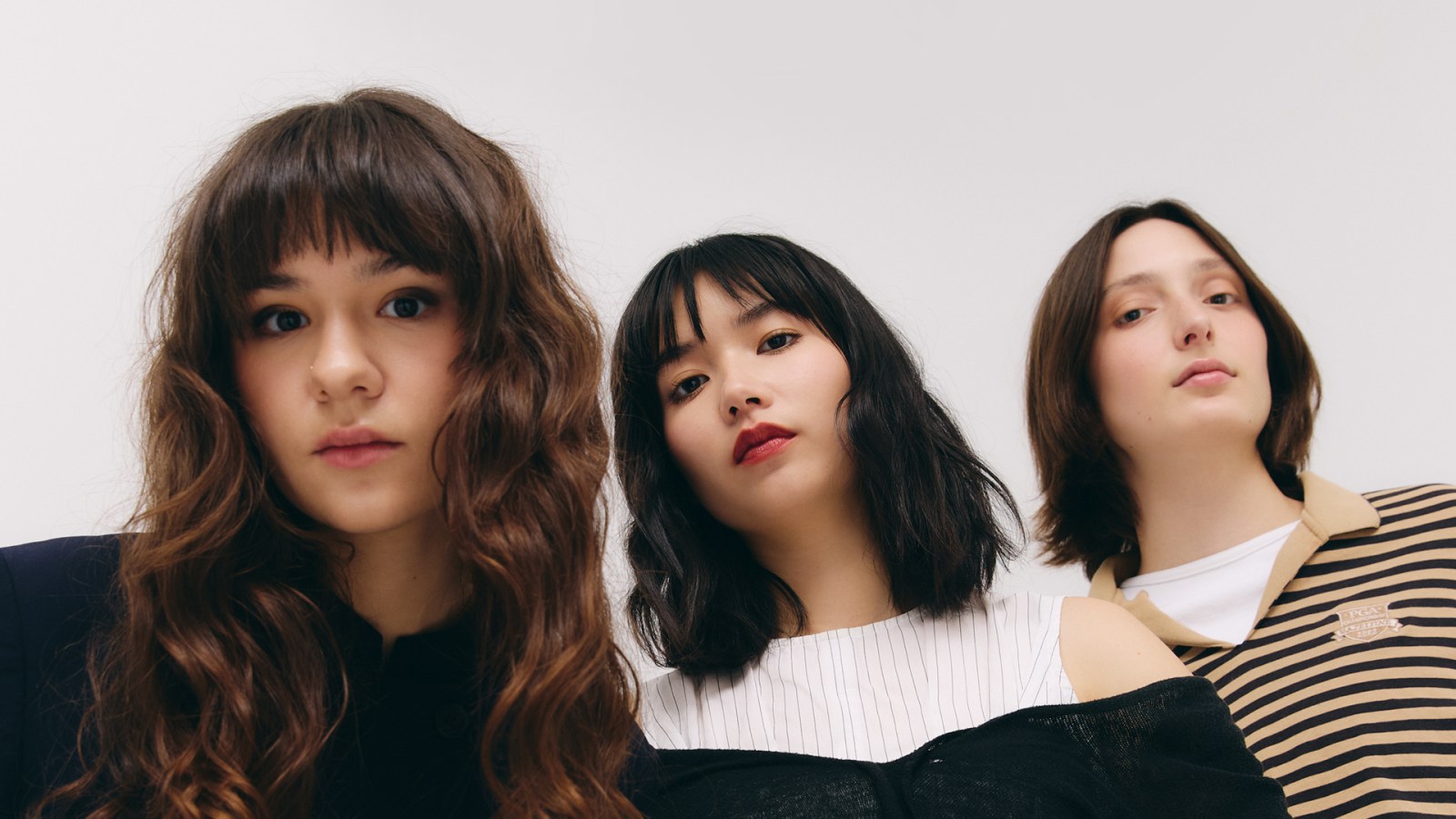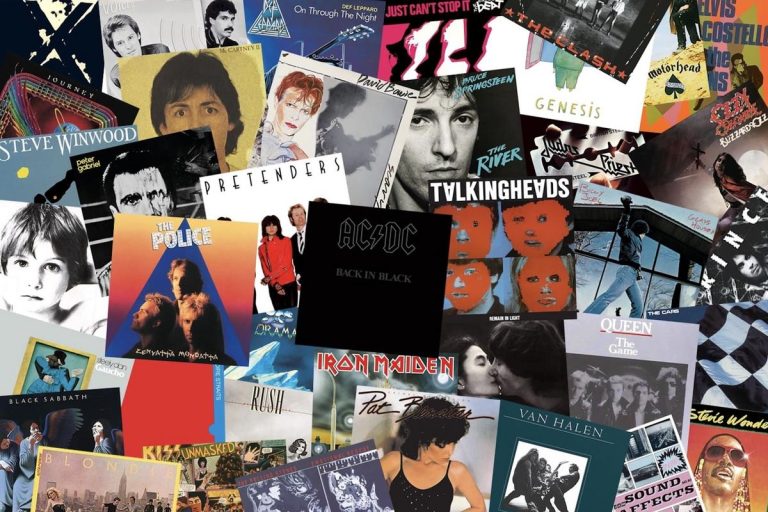H
ere they come now, bustling down the street in Brooklyn, three young musicians wrapped in winter coats and chatting animatedly among themselves as they approach the diner on the corner. It’s a chilly Friday in December, just a couple of degrees above freezing, but that’s nothing for this trio of best friends from Chicago.
“Chicago is a completely different animal,” says singer-guitarist Penelope Lowenstein, 20, as she crowds into a booth beside singer-guitarist Nora Cheng, 21, and drummer Gigi Reece, 22, her bandmates in the resolutely unconventional indie-rock group Horsegirl. “I was having this conversation with my brother. He was like, ‘In Chicago, it’s like you’re traveling from airlock to airlock in the winter.’ It’s like you’re in space or something.”
Lowenstein, Cheng, and Reece have been inseparable since they met in a School of Rock program about six years ago. Two of them are in the middle of exam season at NYU when we meet, but the big event that all three are feeling excited and hopeful about is the Feb. 14 release of Horsegirl’s second album, Phonetics On and On, which they recorded in Chicago a year ago, in January 2024 — “airlock-to-airlock time,” Cheng says.
The magic formula that Horsegirl unlocked as teenagers took effect fast. Within just a few short years, they went from covering Sonic Youth’s “Incinerate” at open mics to featuring two members of Sonic Youth as guest musicians on their critically acclaimed 2022 debut, Versions of Modern Performance, to opening for Wilco and Pavement at sold-out theaters. “It’s really exciting to see that type of post-punk guitar music being reimagined as something that speaks to a different generation,” Jeff Tweedy told Rolling Stone last year, summing up much of Horsegirl’s appeal for Gen X and millennial fans.
For all the success they saw with their first album, though, Horsegirl soon felt eager to move beyond it. “Modern Performance was our high school record, and we knew it when we were making it,” Reece says. “We were straight-up kids.”
Looking back nearly three years later, they see their debut as a vehicle for the overwhelmingly loud live sound they developed to stand out at DIY showcases where they were competing with as many as seven other acts a night. “It felt like we had to take up a lot of space,” Reece says. “It was a big goal of ours to get onstage and make people turn their heads, because it’s so loud, and so crazy, and you would never expect it.”
“Can I bring gender into it?” Lowenstein says.
“Certainly,” Reece replies.
“There’s something about, as a band of young girls, wanting to prove ‘We’re going to be noisy,’” Lowenstein continues. “It made me feel powerful. People would look at us and be like, ‘What?’ And I love that feeling.”
Now, though, they don’t feel the same need to awe listeners right away with titanic waves of sound. Phonetics On and On, produced by Welsh artist Cate Le Bon, features more varied instrumentation and subtler tones overall, opening up Horsegirl’s world in ways that recall the third Velvet Underground LP and Broadcast’s Tender Buttons. “I had never really touched a violin before,” says Cheng, whose squeaky, wailing strings are a highlight of the single “2468.” “It sounds like a children’s recital. But playing an instrument you don’t know, you get that innocence that you can’t fake.”
“They’re just so curious and full of joy for music, and they absolutely love each other,” Le Bon tells me over Zoom later. “It’s a beautiful thing to be around that energy.”
“You can tell that we had fun,” Lowenstein says before the diner closes and the three of them head out into the rapidly darkening late afternoon. “To me, this is music that, as a young girl, I would have loved so much, and it would have made me feel like I could dance.”
A FEW DAYS LATER, I meet Reece at a Cuban café near their apartment in Bushwick; the other two members live one neighborhood over in Bed-Stuy. The drummer tells me that they spent most of the weekend with Cheng and Lowenstein, as usual, seeing some friends play at a record shop one night and attending a zine release party at a church the next. “All of our friends make zines, basically,” they say.
As the only member of Horsegirl who is not currently enrolled in college, Reece has time on their hands, so they’ve begun publishing a zine of their own called My Boyfriend. “It’s a play on, ‘Everything’s about my boyfriend, and my boyfriend knows everything,’” they explain. “All those jokes that you could ever think of. It’s funny, especially because I’m a lesbian.”
Penelope Lowenstein, Gigi Reece, and Nora Cheng (from left)
Reece is the oldest member of Horsegirl, and by far the chattiest. (As Lowenstein puts it, “Gigi is the life of the party.”) They’d been playing drums for less than a year when they answered an Instagram post made by Cheng and Lowenstein searching for someone to round out their new band. “I was really insecure,” recalls Reece, who was 16 at the time. “But they were like, ‘We need a drummer. We’re going to put you behind the drum kit and we’re going to play our shit.’ And you just do it.”
Growing up, Reece had never quite felt like they fit in with the boys and girls around them. Those feelings intensified as Horsegirl began playing shows around their hometown. “We’d show up to a venue and everyone would be like, ‘Oh, the girl band,’” they tell me. “That was dysphoric for me, and it shook me deep to my core.”
During the early phase of the pandemic, with Horsegirl’s music starting to take off but the band stuck at home, Reece had time to think all of this through. “I realized I was nonbinary, and it started to help me feel much more comfortable in my skin, even just to use different pronouns,” they say.
They credit their bandmates with helping them arrive at that clarity. “Penelope and Nora were so instrumental in me realizing that,” Reece says. “Being a part of the band made me realize that I wasn’t being true to myself wholly. I was catching myself being like, ‘I need to dress how Penelope and Nora dress.’ They’re so beautiful and their styles inspire me, but it is not who I am.”
Reece has fond, early memories of bonding with Lowenstein and Cheng at a Car Seat Headrest concert on the 2018 Twin Fantasy tour — “the most teenage show you could ever go to,” they say. Though the three bandmates attended three different high schools, they spent every free moment they could together. “It was really just our weekend fun,” Reece says, tucking into a Cubano sandwich. “It was how we hung out with each other, spending all weekend in Penelope’s basement writing songs.”
It’s moving to think about how those adolescent hangouts have turned into not just a promising career, but a profound avenue of self-actualization for Reece and their bandmates. “We have realized all of ourselves as individuals in a way that I just don’t think we had yet on Versions of Modern Performance,” they say. “We were getting there, but we were teenagers. How could we have?”
Reece has published two issues of their zine so far, and they’re planning a third one dedicated to the new Horsegirl album. “To release an issue of My Boyfriend that wasn’t about that would feel kind of dishonest as to what is going on with my life,” they say, and smile. “So, My Boyfriend loves Phonetics On and On.”
IF ANYONE OVER 30 can be credited with making Horsegirl possible, the Lowenstein parents are surely near the top of the list — having long ago ceded their basement not just to their daughter’s thunderous band, but also to Lifeguard, the even harsher and noisier trio in which her younger brother, Isaac, plays drums. “They were very encouraging,” Penelope tells me over borscht and pierogies at an old-school kosher luncheonette in Manhattan later that week. “They put up with this excruciating Sonic Youth-type shit coming from the basement at all times.”
A ”happy, confident kid” at her Montessori school, Lowenstein started guitar lessons at six years old, and soaked up all kinds of music at home from her dad, a rock fan who had emigrated from Venezuela at age 18, and her mom, who favored Lauryn Hill and Sade. “My parents would let me do whatever I wanted with my personal appearance, which speaks to the creative energy in my house,” she says. “My mom shaved the side of my head for me when I was in fifth grade.”
Though she went next to a high school whose alumni included recording artists like Chance the Rapper — “The security guards would be like, ‘When Chance went here…’” — she had trouble finding peers who shared her wavelength. “I was looking for friends who were freaks, and I did not find that,” Lowenstein says. “When I found Nora and Gigi, it was just like, ‘I don’t even care about this social scene. I just want to be with them all the time and make music.’”

Horsegirl live in New York, July 2023
Photograph by Sacha Lecca
The single that became Horsegirl’s breakthrough, “Ballroom Dance Scene,” didn’t make a huge impact at first when they posted it online in 2020. “No one at school said anything — no one gave a fuck,” Lowenstein says with a laugh. “My parents were like, ‘Hey, great job.’” But it connected with fans like Pavement’s Bob Nastanovich, who featured it on his indie music podcast. “I just thought it was a super cool, obscure seven-inch,” Nastanovich says.
Local press helped boost their profile further, including a pivotal Chicago Tribune feature written by journalist Britt Julious. “That was our first interview,” Lowenstein recalls. “I was so nervous. The big line was like, ‘Horsegirl’s going to have to break up after high school.’ And then it blew up.”
Soon after that, Horsegirl signed to Matador Records, the indie mainstay that had released some of their favorite records. “I was in disbelief,” she says. “That was the label we had dreamt of since we formed.”
Lowenstein stayed in Chicago to finish high school when Reece and Cheng both moved east for college in 2021. “It was such a strange year, because I was completely dependent on Gigi and Nora,” she says. “I was like, who are my friends? I needed to figure out who I was on my own.”
When she followed Cheng to NYU in the fall of 2022, she found her taste in music shifting. “In high school, I was listening to the weirdest shit I could get my hands on. And then I got to college, and I was like, ‘OK, but have I ever gotten into Bob Dylan?’ Like, what about the classics? It’s important to cover that ground as a musician.”
She kept Blonde on Blonde in heavy rotation that first year, along with classic soul music by artists like Al Green. “Those love songs that are just like, ‘I’m laying it all out there’ — that really connected with me,” she continues. “I was listening to it, thinking, ‘Indie rock does not make me feel this way.’”
Those influences made their way into the newly vulnerable lyrics she began writing before joining Cheng and Reece at Wilco’s Loft studio last January. “I don’t think it’s too much to say that right before we went into the studio, I was kind of heartbroken,” Lowenstein says. “And so there was this tenderness to that session for me.”
Songs like the bittersweet single “Julie” (“We have so many mistakes to make/What do you want from them?”) and the eminently hummable “Well I Know You’re Shy” ended up as rich reflections of the romantic highs and lows of one’s early twenties. “I think I literally sent it to this boy, like, ‘Look, I wrote you a song,’” she says of “Well I Know You’re Shy.” “I meant it to be a sweet token of how I felt. But I listen back and I’m like, ‘You were tormented.’”
She’s proud of “Julie,” in particular, seeing it as an emblem of how Horsegirl’s sound blossomed on this album. It began as an acoustic love song with Lowenstein on guitar; when she brought it into the Loft, Reece added a thrumming synth part and Cheng contributed a slow, thoughtful bass line. In the end, they subtracted Lowenstein’s guitar and gave the song a mesmerizing new feel.
“When we took out the part I had written, it was stronger than it had ever been,” she tells me before leaving to go write a term paper on Shakespeare’s The Tempest. “I felt so supported by them, and all I did was sing.”
THOUGH CHENG IS THE most reserved member of Horsegirl, she’s no less full of wit and insight than her bandmates. “People sometimes see Nora as a hard nut to crack because she can be quieter,” Lowenstein tells me. “But when you get to know her, she’s hilarious. She’s super weird in a way that I completely adore.”
I meet Cheng the next afternoon at a coffee shop near NYU’s campus, a few hours after the last exam of her fall semester. “Actually, it’s a class I have with Penelope,” she says, ordering a slice of lemon cake. “Literature of the British Isles, 1600 to 1800.” Both she and Lowenstein are English majors; Cheng’s focus is on creative writing, and some of her lyrics for Phonetics On and On came from poetry she wrote in school.
An only child, she developed a singular perspective on the world by her preteen years. “I thought highly of myself, in a pretentious sense,” Cheng says. “There’s this famous Facebook post that my mom made of me. It’s just a photo of me at our dinner table, and the caption is, ‘Nora in her flannel, telling us about how she likes alternative music and not pop music.’ I think I was in sixth grade.”
At that age, her idea of “alternative music” was 2010s modern-rock acts like Cage the Elephant and Foster the People: “I had a joke that was like, there are so many bands that are Blank the Blank, and I like all of them.” Her dad taught her to play guitar; the one she plays onstage now in Horsegirl is an Ibanez Roadstar II that belonged to him in college.
Like Reece and Lowenstein, she describes meeting her two bandmates in their teens as a big-bang moment that changed everything. “I wanted to find people who liked the same music as me before that, but I didn’t even know it was possible,” she says. She and Lowenstein quickly grew close after they discovered that they were both into louder, more arty bands than their School of Rock counterparts. “We got into Sonic Youth very hard together,” she says. “Daydream Nation was the first record I ever bought with my own money.”
The two guitarists’ distinct approaches to their instruments are a crucial ingredient in Horsegirl’s sound. “Penelope is a shredder,” Cheng tells me, smiling like she’s imparting a juicy secret. “I mean, she keeps that under wraps, because in the types of music we tend to play, shredding is not welcome. But she loves to play the ‘Comfortably Numb’ solo. She’s known it since she was in middle school.” She contrasts this with her own more intuitive style: “I don’t know where any of the notes are on the guitar, so it’s very much a feeling-around process.”
As she nears the end of college, she’s thinking back over her first few years living away from home. “There were times when I was going to the bar at midnight and having a good time — and then your friend groups entirely change,” she says. “Or there’s somebody who for three months, that’s the only person you hang out with, and then you don’t see them ever again. It’s weird. But I feel like I know who my friends that I’ll have after college are at this point.”

Lowenstein, Reece, and Cheng (from left)
In a few months, Cheng will graduate. After that, she’s not sure what she’ll do. “Since Penelope has another year of college, it’s going to be a weird limbo thing with Horsegirl,” she says. “I wouldn’t want to do more school right now necessarily. But it’s scary. I’m going to have to get some sort of job.… I’ve never lived in New York and not gone to school, so I’m excited to see what that’s like.”
All three members of Horsegirl go home to Chicago regularly, including trips for both Thanksgiving and January break. When they’re in town there, they take their place as flagship artists of a thriving rock scene that also includes the earnest emotional howls of Friko, the hooky mod pop of Sharp Pins, the blistering noise of Twin Coast, and many, many more bands and zines. “It’s just really grounding for me every time I go back,” Lowenstein tells me.
The bandmates all agree that they will return to Chicago for good after Lowenstein graduates in 2026. “The plan is to move back to Chicago,” Reece says in a definitive tone. Then they waver.
“But … I’m not sure,” Reece adds. “I mean, New York, we do have a life here now. I think it’s going to be harder to leave than we think it is.”
Production Credits
Hair by DANIEL J, LUTZ. Makeup by MAGDALENA MAJOR At SEE MANAGEMENT using LAURA MERCIER. Photographic assistance by BRYAN SARGENT. Makeup assistance by CHELSEA RACHEL.




Leave a Comment